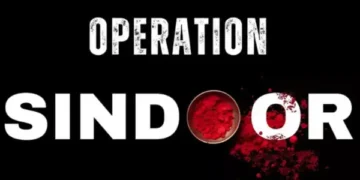Shashi Tharoor highlights how India’s Op Sindoor military briefing served as a calculated response to recent comments by the Pakistan Army Chief, emphasizing diplomatic strength and regional deterrence.
Shashi Tharoor Says Operation Sindoor Briefing Sent Strong Message to Pakistan, Global Community

Congress leader Shashi Tharoor commended the Indian government’s strategic communication regarding Operation Sindoor, describing it as a calculated and inclusive response to recent remarks by Pakistan Army Chief General Asim Munir. Speaking to NDTV, Mr. Tharoor—an MP from Thiruvananthapuram—highlighted the symbolic importance of including Foreign Secretary Vikram Misri and two women officers in the official briefing. According to him, this move projected India’s commitment to diversity, professionalism, and its firm stance against terrorism.
Shashi Tharoor emphasized that the composition of the briefing panel sent a powerful diplomatic signal—not only to Pakistan but also to the international community—at a time when global attention is focused on stability in South Asia.
He said the measured approach demonstrated India’s maturity and resolve, particularly in the face of provocations that sought to communalize geopolitical tensions.
“India’s messaging was smart and deliberate,” Tharoor remarked. “It shows that we stand united, and our actions are rooted in principles, not polarization.
Our messaging today, both to Pakistan and the international community, was executed with clarity and purpose,” he stated. “This morning’s briefing was led by Foreign Secretary Vikram Misri, a Kashmiri Pandit, and notably supported by two women officers — one of whom was Muslim — underscoring that this is not a Hindu-Muslim issue, contrary to Pakistan’s narrative.”
In response to the deadly terror attack in Pahalgam, which claimed the lives of 24 tourists and a local pony operator, India carried out precision strikes on nine targets across Pakistan and Pakistan-occupied Kashmir.
Foreign Secretary Vikram Misri, along with Colonel Sophiya Qureshi and Wing Commander Vyomika Singh, conducted the official briefing. Mr. Misri outlined India’s rationale behind the airstrikes, emphasizing Pakistan’s persistent inability to control cross-border terrorism originating from its territory. Colonel Qureshi and Wing Commander Singh then provided operational details of the precision strikes carried out yesterday.
Mr. Tharoor responded firmly to the remarks made by Pakistan Army Chief General Asim Munir, emphasizing that India stands united in the face of terrorism. ‘While General Munir casts doubt on the coexistence of Hindus and Muslims, we are showing the world that our strength lies in our unity. We are one nation, united against terror and firmly resisting Pakistan’s malicious designs. This solidarity sends a powerful message—I take great pride in that,’ he stated.
The Congress MP expressed support for India’s counterstrike, emphasizing that both his party and all Indians stand united behind the armed forces. Responding to a question about the global reaction, he noted that France, Russia, and Israel have clearly recognized India’s right to defend itself against terrorism. While other countries have used more measured language, they have generally called for restraint and de-escalation—an approach he welcomed, clarifying that India does not seek further escalation.
Table of Contents
“China, often described as Pakistan’s ‘all-weather friend,’ might have been expected to take a more assertive stance in support of Islamabad. However, Beijing has instead adopted a balanced and diplomatic tone, emphasizing that both India and Pakistan are its neighbors and expressing a desire to avoid conflict. China has called for calm, dialogue, and negotiation — a stance that promotes peace and stability. From this, one can conclude that the international community, on the whole, is not in favor of war and is likely urging Pakistan to exercise restraint.”
Mr. Tharoor stated that the airstrikes were conducted after 1 a.m. to minimize civilian casualties, as the streets would be empty at that hour. The intended targets were terrorist camps, not Pakistani military or government installations. “We deliberately avoided striking military or official sites—not because we believe the Pakistani military was uninvolved. On the contrary, we are convinced they played a key role in training, arming, and supporting the terrorists behind the Pahalgam attack. However, our restraint demonstrates that we are not seeking a prolonged conflict. Our actions were measured and aimed solely at delivering justice for the 26 innocent lives lost,” he explained.
“The onus is now on Pakistan, and should it choose to escalate the situation, India is fully prepared and will respond accordingly,” Mr. Tharoor stated.















 Categories
Categories









